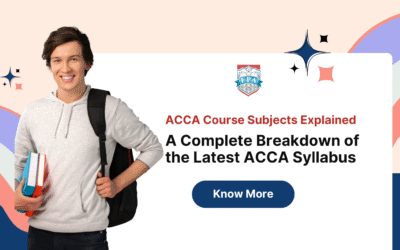About ACCA Course:
ACCA stands for Association for Chartered Certified Accountants. It is a UK based accounting body, founded in Founded in 1904, the Association of Chartered Certified Accountants (ACCA) is the oldest global professional accounting body offering the Chartered Certified Accountant / ACCA qualification. It is also one of the most widely accepted accounting qualification with over 250,000 members and 600,000 students in 180 countries. ACCA is headquartered in London, and works through a network of over 100 offices and centres in 52 countries with more than 7,000 Approved Employers worldwide (India included).
ACCA Course Syllabus and Exam Structure:
The Acca course is divided into 3 levels, Knowledge Level, Applied Skills and Applied Professional level. Knowledge level consists of 3 papers, Business and Technology (BT), Management Accounting (MA) and Financial Accounting (FA). All these papers are on demand computer based exams, can be sat any time of the year from home as well as approved CBE centres. The papers are 2 hour long and consists of Multi task questions, and are all objective type.
The Skills level consists of 6 papers, Corporate and Business Law (LW), Performance Management (PM), Taxation (TX), Financial Reporting (FR), Audit and Assurance (AA) and Financial Management (FM). Again just like knowledge level these are a online exams however they are session bases, i.e. exams are conducted in March, June, September and December every year. The exams can be done from home as well as ACCA designated centres all over the world. The papers are Multi Task as well as long scenario based questions, with 60% objective and rest long questions. AA is an exception where 30% is objective and rest all long questions.
The final level is professional level wherein there are 6 papers, Strategic Business Leader (SBL– Essential), Strategic Business Reporting (SBR – Essential), Advanced Financial Management (AFM), Advanced Performance Management (APM), Advances Taxation (ATX), Advance Audit and Assurance (AAA). The first two papers i.e. SBL and SBR are essential, and from the remaining 4 you need to select any 2. Therefore ACCA Course gives you an opportunity to specialize in the area you would like which makes the course all the more flexible. Here the format is completely scenario based, therefore only if your concepts are clear, you will be able to crack the papers.
ACCA Exam Pass Rates:
In terms of pass rates, the avg. at KL is about 70%, whereas at SL it is around 45%, and at PL is around 42%. Therefore overall the pass rates are in the range of 40 to 50% which makes it a very doable course. Ofcos one cannot assume the course to be easy, it is very rigorous, and people should take the advantage of 1 paper every quarter and try and finish the course in about 3.5 years.
ACCA Eligibility:
In terms of ACCA Course eligibility, any who has cleared their 10th should be able to start their ACCA journey through Foundations in Accountancy (FIA) route. If people have cleared their 12th, they directly start with ACCA. However irrespective of route you chose, the number of papers are 13. For more details on ACCA minimum requirements click on link below:
https://www.accaglobal.com/lk/en/qualifications/glance/acca/minimum-entrance.html
ACCA Jobs:
Once you are done with ACCA, the jobs are available in all the streams i.e. Tax, Audit, Accounting, Finance etc. with most of the MNC’s hiring ACCA’s round the year. Also Big 4’s usually hire in big numbers with salaries starting as high as 6 lacs for fresher ACCA. Therefore when it comes to opportunities, not only do ACCA’s have global options, they also have international opportunities. Especially when you look at jobs in middle east, Canada, Australia and UK, there are plenty of openings. So overall it’s a great course, and anyone who wants to become a CA however wants to only sit for one paper at a time, and more flexibility of when to sit which papers, then ACCA is the right choice. For the current job openings, you can find more information on the ACCA jobs portal, click on the link below:
ACCA Fees:
The fees is divided into two parts, one that you pay to the ACCA board directly and the second is that you pay to tuitions provider. So the first part which you pay directly to ACCA consists of
Registration – 30 GBP
Annual Subscription – 116 GBP
Exams Fees –
KL – Rs 10500
SL (Law) – Rs 11500
SL – 129 GBP
PL – 162 GBP
PL (SBL) – 227 GBP
Overall in Indian Rs terms the spend on ACCA body fees is roughly 1.8 Lacs. This will change should you take exemptions. Fees is subject to change from time to time, therefore always check with your counselors for the latest fees amounts. For more information and latest updated fees click on the link below:
https://www.accaglobal.com/us/en/qualifications/accountancy-career/fees/fees-charges.html
In addition to this, the FPA coaching fees is Rs 86,000 for knowledge level, Rs 1,24,000 for Skill level and Rs 1,20,000 for Professional level.
What does FPA fees get you?
- ACCA Approved content from Kaplan/BPPwhich includes study text, exam test series,
- Over 6 mocks and progress tests
- Unlimited doubt solving
- Live offline/online lectures
- Unlimited views of lecture recordings
- Support until you clear your acca exams guarantee
- Best faculties in the country
- Placement assistance for jobs at Big 4’s and top MNC’s
-
ACCA Exemptions:
- If you’re B.com and M.com from one of the approved universities then Knowledge Level & LW.
- If youre an MBA, BMS (Finance), BAF, BBI, BFM then full Knowledge Level.
- If you have completed CA IPCC both groups then Knowledge Level, TX & AA papers.
- If you’re CA and ICWA (CMA) qualified then Knowledge Level & Skills Level.
- Ofcos there are lots of permutations and combinations possible, therefore its best that you reach out to ourcounselor who will ensure you get the max exemptions. We know for a fact that even part qualified CA’s can sometime get almost all exemptions.
For more information on possible exemptions you’re eligible for click in link below:
https://www.accaglobal.com/uk/en/help/exemptions-calculator.html
ACCA Practical Experience Requirement (PER):
The PER is a compulsory element of becoming an ACCA. It requires 3 years of work experience in any of the finance and accounting industry along with mandatory experience in some of the technical areas. The objectives are split between five Essentials and any four Technicalperformance objectives. This can be gained by completing experiencerequired to achieve the necessary elements and completea statement for each performance objective, which aresigned off by your practical experience supervisor. Students needs to record your PER progress in their online MyExperience record, which can be accessed via myACCA. For further details click on this link:
https://www.accaglobal.com/gb/en/learning-provider/acca-tutor-resources/per-guidance-resources.html
ACCA Ethics and Professional Skills Module (EPSM):
EPSM is a mandatory module that students need to complete to become an ACCA. Infact it is best that students do the EPSM even before they start to do their professional level exams as research by ACCA suggests that students who have done the EPSM have high chances of clearing exams compared to students who haven’t. Its an online module and students need to pay a minimal fees to access this. The module is self paced and at the end of the module students are made part of cohorts where they present to each other on their key learnings.
https://www.accaglobal.com/gb/en/affiliates/completing-your-epsm.html
What is ACCA Affiliate:
Affiliate is the status you get once you’re done with all the your exams and ethics and professional skills module (EPSM). Only once you have completed your 3 years of Practical Experience Requirements (PER) you would be able to apply for the membership.
ACCA Membership:
It means you have completed all the requirements of becoming an ACCA member like cleared all papers, EPSM and PER and now with pride you can use ACCA in front of your name. Benefits of ACCA membership include networking with fellow acca members across the globe, attend seminars and networking events in your city and most importantly continue to stay updated with what’s happening in the industry by completing the CPD (Continuous Professional Development) points. A lot of trainings are free while you can also do some paid ones to keep your membership updated.
If you do plan to do the course, you should definitely go with an approved partner who will ensure not only right level of support but also the push to the students that is sometimes required in courses like ACCA.





